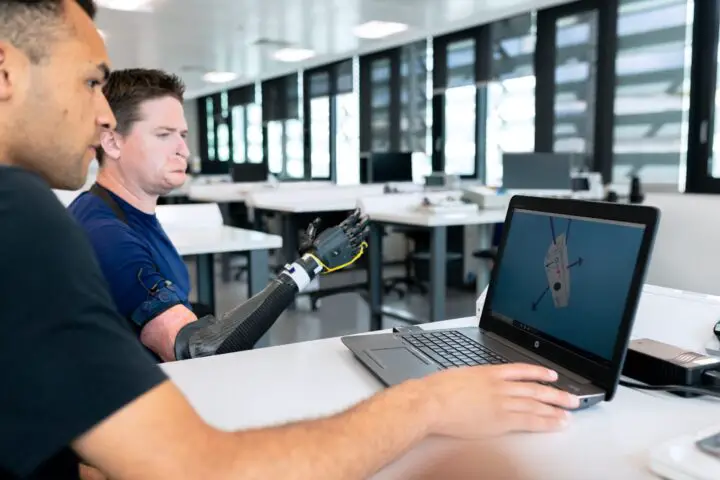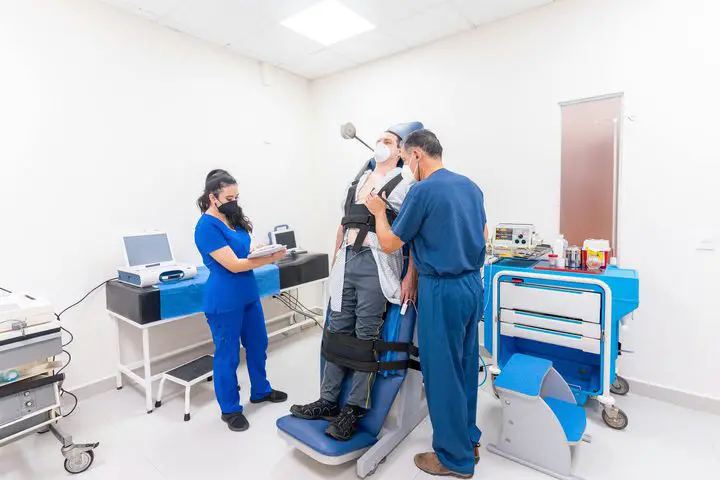Artificial intelligence (AI) has become an Impact on the healthcare sector, with the potential to completely change how we approach patient care, diagnosis, and treatment. Healthcare institutions, researchers, and technology businesses across the world are paying close attention to it because of its potential to increase accuracy, efficiency, and patient outcomes. We will analyze implementation tactics, spotlight organizations at the vanguard of this transition, examine the profound effects of AI in healthcare, and talk about the sector’s bright future in this in-depth investigation.
Implementation Strategies for AI in Healthcare
The successful implementation of AI in healthcare requires careful planning, integration, and adherence to ethical and regulatory standards. Here are the key steps and strategies for healthcare organizations looking to adopt AI:
- Data Acquisition and Management: To train AI models effectively, healthcare organizations must collect and maintain high-quality, standardized data. This may involve digitizing paper records, integrating various data sources, and ensuring data privacy and security.
- Selecting the Right AI Tools: Choosing the appropriate AI tools and algorithms is crucial. Healthcare organizations should evaluate solutions based on their specific needs, whether it’s for diagnostic imaging, predictive analytics, or patient engagement.
- Regulatory Compliance: Ensuring compliance with healthcare regulations like HIPAA (Health Insurance Portability and Accountability Act) is paramount. AI systems must protect patient data and adhere to legal and ethical standards.
- Integration with Clinical Workflow: AI solutions should seamlessly integrate into the existing clinical workflow to maximize their utility. Clinicians should be trained in how to use AI tools effectively.
- Interoperability: Promoting data interoperability among different healthcare systems is essential to make AI insights accessible across the healthcare continuum. Standards like FHIR (Fast Healthcare Interoperability Resources) play a crucial role in achieving this goal.
- Telemedicine and Remote Monitoring: AI-driven telemedicine platforms enable remote consultations and continuous patient monitoring. This is especially crucial in situations like the COVID-19 pandemic, where remote healthcare has become a necessity. Companies like Teladoc have made significant strides in this area.

Implementation Strategies for AI in Healthcare
The successful implementation of AI in healthcare requires careful planning, integration, and adherence to ethical and regulatory standards. Here are the key steps and strategies for healthcare organizations looking to adopt AI:
- Data Acquisition and Management: To train AI models effectively, healthcare organizations must collect and maintain high-quality, standardized data. This may involve digitizing paper records, integrating various data sources, and ensuring data privacy and security.
- Selecting the Right AI Tools: Choosing the appropriate AI tools and algorithms is crucial. Healthcare organizations should evaluate solutions based on their specific needs, whether it’s for diagnostic imaging, predictive analytics, or patient engagement.
- Regulatory Compliance: Ensuring compliance with healthcare regulations like HIPAA (Health Insurance Portability and Accountability Act) is paramount. AI systems must protect patient data and adhere to legal and ethical standards.
- Integration with Clinical Workflow: AI solutions should seamlessly integrate into the existing clinical workflow to maximize their utility. Clinicians should be trained in how to use AI tools effectively.
- Interoperability: Promoting data interoperability among different healthcare systems is essential to make AI insights accessible across the healthcare continuum. Standards like FHIR (Fast Healthcare Interoperability Resources) play a crucial role in achieving this goal.

Leading Organizations in AI Healthcare Implementation
Numerous healthcare organizations and tech companies have already embarked on their AI journey, showcasing remarkable results, and setting the stage for further innovation. Here are a few notable examples:
- IBM Watson Health: Pioneering AI-driven solutions for healthcare, IBM Watson Health empowers clinicians with its cognitive computing platform, facilitating data-driven decision-making and personalized patient care.
- Google Health: Google’s commitment to healthcare innovation is evident in its development of AI-powered tools for medical imaging analysis, drug discovery, and predictive healthcare analytics, with a focus on improving patient outcomes.
- Siemens Healthineers: Renowned for its cutting-edge medical technology, Siemens Healthineers employs AI to enhance diagnostic accuracy across a range of medical disciplines, such as radiology and laboratory diagnostics, thus optimizing patient care.
- PathAI: As a dynamic startup, PathAI specializes in AI-driven pathology, equipping pathologists with tools that enhance disease detection accuracy, particularly in the critical field of cancer diagnosis and treatment.
- Philips Healthcare: A global leader in healthcare technology, Philips incorporates AI into its solutions, including patient monitoring, radiology, and telehealth services, to elevate clinical decision-making and patient care.
- GE Healthcare: Renowned for its healthcare equipment, GE Healthcare integrates AI into medical imaging systems, providing healthcare professionals with advanced diagnostic insights to improve patient outcomes.
- NVIDIA: This technology powerhouse not only provides the hardware for AI applications but also actively collaborates with healthcare organizations, enabling AI to accelerate scientific research, drug discovery, and medical imaging.
- Zebra Medical Vision: Focused on AI radiology solutions, Zebra Medical Vision utilizes machine learning algorithms to detect a wide range of medical conditions from medical imaging, thus improving early diagnosis and treatment.
- Tempus: A data-driven healthcare technology company, Tempus utilizes AI to analyze clinical and molecular data to provide physicians with insights for personalized cancer care and research.
- PathAI: With its AI-powered pathology solutions, PathAI aids pathologists in delivering more precise diagnoses, contributing significantly to the accuracy and effectiveness of patient care.
- Olive: An AI-powered automation platform, Olive streamlines healthcare administrative tasks, helping hospitals and healthcare systems optimize their operations, reduce costs, and enhance efficiency.
- DeepMind Health (a subsidiary of Alphabet): DeepMind Health focuses on leveraging AI to enhance healthcare delivery, with notable projects including AI-assisted diagnosis and improving patient care through predictive analytics.
The rapidly changing environment of AI in healthcare is best represented by these organizations, among others, who are pushing the envelope and working together to usher in a time of more precise diagnoses, individualized care, and enhanced patient care. They have the potential to improve the healthcare sector with their ongoing efforts.

The Future of Healthcare with AI
The integration of AI in healthcare holds immense promise for the future of medicine:
- Tailored Treatment Plans: AI will enable healthcare providers to create highly personalized treatment plans, considering a patient’s genetics, medical history, and real-time health data for more effective care.
- AI-Enhanced Diagnostics: AI-powered diagnostic tools will become even more accurate, allowing for earlier and more precise disease detection, ultimately saving lives and reducing treatment costs.
- Predictive Preventive Care: AI’s predictive capabilities will enable proactive healthcare interventions, identifying individuals at risk of developing certain conditions and implementing preventive measures.
- Drug Discovery Revolution: AI will continue to accelerate drug discovery by analyzing vast datasets, leading to the development of groundbreaking therapies for complex diseases.
- Telemedicine Evolution: Telemedicine will evolve to offer a seamless blend of in-person and virtual care, providing greater accessibility to healthcare services, especially in remote or underserved areas.
- Remote Monitoring and Wearables: Wearable devices and remote monitoring solutions will become standard for managing chronic diseases, allowing continuous patient tracking and early intervention when necessary.
- AI-Assisted Surgery: Surgeons will increasingly rely on AI-assisted robotic systems for precision and minimally invasive procedures, reducing patient recovery times.
- Enhanced Healthcare Access: AI-driven chatbots and virtual health assistants will provide instant access to medical information, making healthcare more accessible and convenient.
- Population Health Management: AI will play a central role in managing public health by identifying trends and implementing preventive measures on a larger scale.
- Data-Driven Decision-Making: Data analytics and AI will inform healthcare policies, enabling policymakers to make data-driven decisions for better resource allocation and healthcare system optimization.
- Patient-Centered Experiences: AI will enable patient-centric healthcare, with personalized recommendations, easy appointment scheduling, and simplified billing processes.
- Healthcare Robotics: Robots equipped with AI will assist with tasks like patient care, medication distribution, and even companionship for geriatric individuals in healthcare facilities.
- AI for Mental Health: AI-driven mental health applications will become more prevalent, offering support for early detection and treatment of mental health conditions.
- Ethical AI Integration: The future will demand stringent ethical AI integration, addressing bias, and privacy concerns, and maintaining transparency in AI-assisted decision-making.
- Continuous Learning and Adaptation: AI systems will continually learn and adapt to new medical knowledge, ensuring that healthcare practices stay up to date with the latest research and guidelines.
- Reduced Healthcare Disparities: AI can help reduce healthcare disparities by providing equitable access to healthcare services and tailoring interventions to meet the specific needs of diverse populations.
- AI in Drug Repurposing: AI algorithms will identify new applications for existing drugs, potentially leading to cost-effective treatments for a wide range of diseases.
- Global Healthcare Collaboration: AI-driven platforms will facilitate global collaboration among healthcare professionals and researchers, allowing for faster responses to global health crises.
- AI-Enhanced Radiology: AI will continue to advance radiology with more sophisticated image analysis, aiding in early cancer detection and complex medical imaging interpretations.
- Healthcare Innovation Ecosystem: The future of healthcare will involve a thriving ecosystem of startups, tech giants, healthcare providers, and researchers working collaboratively to push the boundaries of AI’s potential in medicine.
However, difficulties persist. Maintaining data privacy, tackling issues with bias in algorithms, and ensuring the ethical use of AI will all be continuing priorities. Furthermore, healthcare practitioners need to get used to dealing with AI systems and have faith in the data they produce.

In conclusion, AI has the potential to drastically change the healthcare industry. The future of healthcare appears increasingly bright as technology continues to grow since it can already improve diagnosis, treatment, and patient care. To fully utilize AI while tackling the accompanying issues, healthcare organizations, academics, and policymakers must collaborate. The goal is to establish a healthier, more effective, and accessible healthcare system for all.


































[…] As technology continues to advance and genomic sequencing becomes more accessible, the future of genomic medicine is poised to improve patient care, enhance disease prevention, and revolutionize the healthcare landscape. The journey toward personalized medicine, guided by the unique genetic makeup of everyone, represents a promising future for healthcare. […]
[…] AI Integration: AI will continue to play a central role, enhancing diagnostic accuracy and enabling predictive analytics for disease prevention. […]
you’re in point of fact a just right webmaster. The site loading pace is amazing. It seems that you are doing any distinctive trick. Moreover, The contents are masterpiece. you’ve done a excellent activity on this subject!